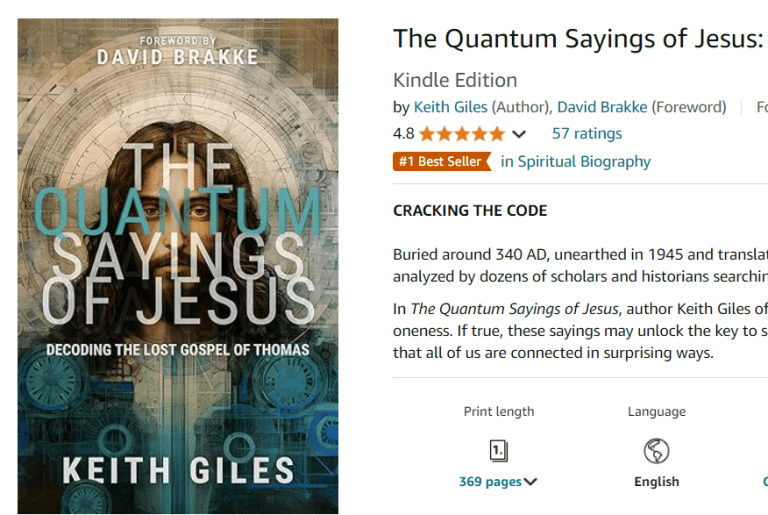
In what we call “The Real World,” what counts most is power, strength, intelligence, and self-confidence.
Our society teaches us that to succeed, we must be powerful, confident, and in control. Yet, there’s a fascinating concept found in one of the Apostle Paul’s epistles that presents an entirely different perspective—one that turns those values upside down. It’s the paradox of the Kingdom of God and we can summarize what Paul says like this: True strength is found in weakness, and God’s power is made perfect in our limitations.
The Kingdom Paradox: Strength in Weakness
In 2 Corinthians 12:9, the apostle Paul writes:
“But he said to me, ‘My grace is sufficient for you, for my power is made perfect in weakness.’ Therefore I will boast all the more gladly about my weaknesses, so that Christ’s power may rest on me.”
The Apostle Paul did not claim his success came from his own strength, wisdom, or status. Rather, he often downplayed all the things that one might tend to boast about, and instead, he embraced his weaknesses. Why? Because he understood that, in his limitations, God’s true power was revealed.
When I first came across this idea, I was puzzled, but eventually I started to realize something astounding: This principle is evident throughout the entire Bible.
It’s true! God continually chooses the least, the broken, and the unqualified to accomplish the greatest works.
Let’s explore some of the most powerful examples of this pattern in Scripture.
David: The Overlooked Shepherd Becomes a King
When God sought a new king for Israel, the instructions to the prophet were simple: Tell Jesse that one of his son’s will become the next King of Israel.
When the prophet Samuel came to Jesse’s house to anoint the new king, Jesse presented his older, stronger sons. Yet, one by one, God rejected them. Finally, Samuel asked, “Are these all your sons?” Only then did Jesse mention David, who was out tending the sheep.
David was overlooked by his own Father, but chosen by God.
This story reminds us that God looks at the heart, not outward strength or qualifications.
In other words, God loves to do extraordinary things through ordinary people.
Gideon: The Fearful Warrior
When Israel was oppressed by the Midianites, God called Gideon to be their deliverer. But Gideon’s response was not one of confidence:
“But Lord, how can I save Israel? My clan is the weakest in Manasseh, and I am the least in my family.” (Judges 6:15)
Please note: When God wanted to rescue the Israelites from their oppressors, the choice was someone from the weakest class who was the least of his family.
Got it?
After this, God reduced Gideon’s army from 32,000 men to just 300 men, and with that tiny, unlikely force, Gideon defeated the Midianites.
Moses: A Stammering Prophet
Moses was raised in Pharaoh’s palace but spent forty years in the wilderness after killing an Egyptian. When God called him to lead Israel out of slavery, Moses protested:
“O Lord, I have never been eloquent… I am slow of speech and tongue.” (Exodus 4:10)
Now…before all of this, Moses believed he was “The Chosen One” who would set his people free. That’s when he ended up killing a man in the first place. He believed he had the power and his power took someone’s life.
Years later, despite his shortcomings, Moses was finally humble enough to do something extraordinary: Trust in someone other than himself.
Samson: Strength from God, Not Man
Most Children’s story books and animated Bible Stories portray Samson as a giant, muscular warrior, sort of like He-Man or the Hulk.
NEWSFLASH: Scripture never describes Samson this way.
If Samson had been naturally strong, why would the Philistines be so desperate to find the source of his strength?
This is why I contend that Samson was a little, short, skinny Jewish guy who would never intimidate anyone .
What the story does say is that his strength came from the Spirit of the Lord:
“And the Spirit of the Lord came upon him in power…” (Judges 14:6)
The Lesson: God uses the weak to confound the strong.
The Woman at the Well: An Unlikely Evangelist
In Jesus’ time, women were marginalized, and Samaritans were despised by the Jews.
Yet, Jesus intentionally sought out a Samaritan woman—an outcast even among her own people. She was literally, the least [a woman] of the least [a Samaritan] of the least [an adulteress].
Here’s the point: Jesus chooses the broken, the rejected, and the “unworthy” to change the world.
Why? Because God loves to do extraordinary things through ordinary people.
Jesus: The Ultimate Example of Strength in Weakness
The greatest demonstration of God’s power in weakness is Jesus Himself.
Born in a stable, raised in humility, Jesus was not the warrior king Israel expected.
Instead of conquering with armies, Jesus conquered through service. Instead of taking power, Jesus kneeled down to wash feet.
His ultimate moment of weakness—the cross—became the greatest victory in history when he forgave those who were murdering him.
Jesus’s strength was his weakness and humility.
We are told to emulate this attitude in Philippians, Chapter 2:
“Therefore if you have any encouragement from being united with Christ, if any comfort from his love, if any common sharing in the Spirit, if any tenderness and compassion, then make my joy complete by being like-minded, having the same love, being one in spirit and of one mind. Do nothing out of selfish ambition or vain conceit. Rather, in humility value others above yourselves, not looking to your own interests but each of you to the interests of the others.
“In your relationships with one another, have the same mindset as Christ Jesus:
“Who, being in very nature God,
did not consider equality with God something to be used to his own advantage;
rather, he made himself nothing
by taking the very nature of a servant,
being made in human likeness.
And being found in appearance as a man,
he humbled himself
by becoming obedient to death—
even death on a cross!
“Therefore God exalted him to the highest place
and gave him the name that is above every name,
that at the name of Jesus every knee should bow,
in heaven and on earth and under the earth,
and every tongue acknowledge that Jesus Christ is Lord,
to the glory of God the Father.”
What Does This Mean for Us?
If God consistently chooses the weak, the broken, and the ordinary to accomplish His will, then what does that mean for us?
It means that our weaknesses do not disqualify us. Our struggles, failures, and inadequacies are not barriers to God’s power; they are, in fact, the very things God leverages to change the world around us.
Instead of asking God to remove our weaknesses, what if we embraced them?
What if, instead of seeing our shortcomings as limitations, we saw them as opportunities for God’s strength to be revealed?
A Call to Embrace Weakness
Even the Apostle Paul understood this truth when he declared:
“For when I am weak, then I am strong.” (2 Corinthians 12:10)
We live in a world that tells us to hide our weaknesses, to project strength, and to rely on ourselves. But the Gospel invites us to a different path—the path of humility, trust, and surrender.
So…if you feel like you’re not enough, if you feel too weak, too broken, or too insignificant, then, take heart my friends, because you are exactly the kind of person God is looking for!
In God’s Kingdom, the last are first, the weak are strong, and the ones who embrace their weakness are the ones through whom the power of Christ shines through.
Why? Because, as I’ve said several times: God loves to do extraordinary things through ordinary people.
Just like you. Just like me.
“God made the world from nothing, and if we can be nothing, then God can make something of us.” – Martin Luther King, Jr.

The book from Keith Giles, “The Quantum Sayings of Jesus: Decoding the Lost Gospel of Thomas” is available now on Amazon. Order HERE>
Keith Giles is the best-selling author of the Jesus Un series. He has been interviewed on CNN with Anderson Cooper, Coast to Coast Radio with George Noory, USA Today, BuzzFeed, and John Fugelsang’s “Tell Me Everything.”
He co-hosts The Heretic Happy Hour Podcast and his solo podcast, Second Cup With Keith which are both available on Spotify, Amazon, Apple, Podbean or wherever you find great podcasts.

















